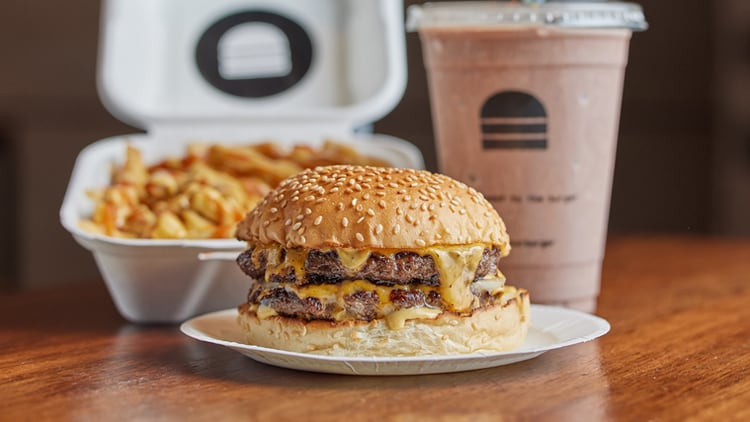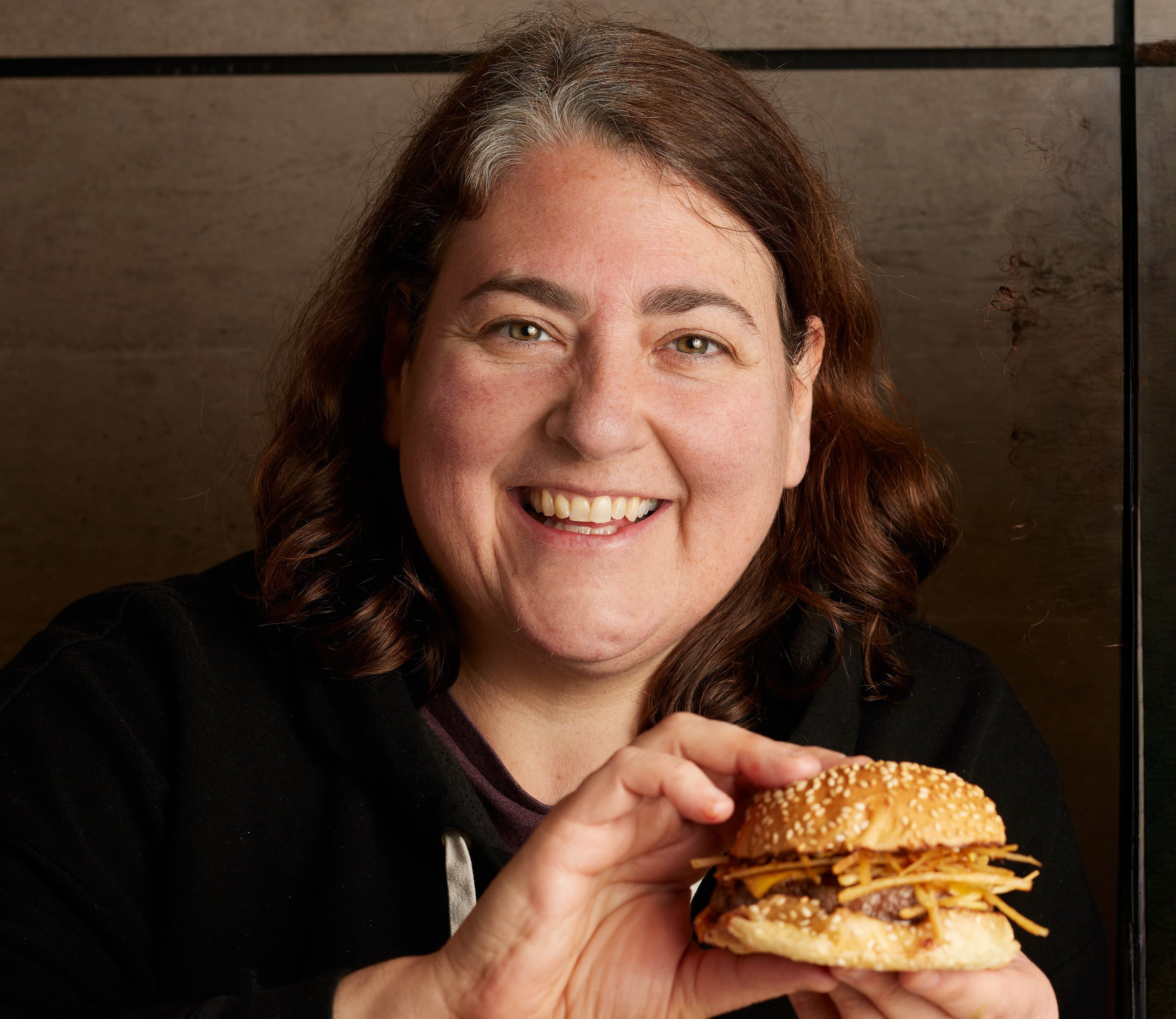In August last year, Bleecker Burger opened its first new restaurant in five years, taking over a site on Tooley Street, just a few minutes’ walk from London Bridge station. Having not opened a restaurant since 2019, some wondered whether the group had reached its peak; whether the evolution of the London burger market, which these days appears more consumed than ever by the influence of American-style smash burgers and more dominated than ever by US-founded brands, meant that Bleecker’s time in the sun had passed.
And yet, as numerous TopJaw videos demonstrate, Bleecker remains one of the most revered burger spots in London. One of the golden generation of street food concepts, Bleecker built a reputation for serving one of the most uncompromising burgers in the capital’s street food scene, based on a no-frills formula of patty, bun and cheese championed by founder and New York native Zan Kaufman.
Bleecker launched back in 2012 with KERB and opened its first permanent concession site within Spitalfields Market in 2015. Now, a decade on from Spitalfields, its estate comprises 10 sites including four full-service restaurants, three concessions, and three delivery-only kitchens. That total not only includes the London Bridge outpost, but also a kiosk within KERB’s Seven Dials Market, which opened in January this year; and its latest bricks and mortar restaurant, on Baker Street, which launched earlier this month.
Aa Bleecker beds into its new locations, we sat down with Kaufman to chat about the group’s recent growth, and whether she’s planning for any further growth in the near future.
What propelled this recent expansion push?
The last time we opened was Westfield in 2019. Bleecker is an independent business, and we’ve had a phenomenal run over the last five years, which brought in loads of cash, and we didn’t want to just be sitting on that. We needed to expand, and all the opportunities just came at once. We’ve gone from not talking about cash for five years to talking about it every single day. It’s been a huge shift in mindset for me. Leading a company that has four plus sites with revenue of £6m to £10m, up to one with double that and turnover of up to potentially £20m is a major change. Reconciling that in my mind is not a journey I’ve come to the end of yet.
I’m a burger expert and have spent the last 15 years on this one product, our product, and I still haven’t cracked it
What’s been the biggest shift for you personally as Bleecker has grown?
Before we expanded, we became a London living wage employer, which is a great decision we were able to make. So now with all these new openings it’s about protecting that, and it changes my energy. Everything has an implication, and the impact is so much broader. So, I’m thinking further ahead instead of being reactive. That’s probably the biggest shift.
How did you go about choosing where to open next?
We knew we needed to be central. We’ve never been a tangential brand; we need a lot of volume. London Bridge came and made sense. It’s a super high footfall area and it’s slightly off-piste so the rent is affordable, and the size of the site was right. We operate in small sites and that’s what I always want. I don’t ever want a place with 60 seats or more, it’s not who we are.
Is the bulk of Bleecker’s trade grab-and-go?
It’s about a 50/50 split. People are eating in more than I anticipated, but it’s not a long dwell time. That has a lot of implications too, though. We’ve always been focused on food and the vision there, but service has gone on a journey. We used to take orders face to face, then Covid came, and we turned to kiosks. Fast forward four years and we’re not delivering the service I want, and that’s because we don’t have the opportunity to speak to the customer. So, at Baker Street we’re changing that up and taking out the kiosks. There’s so much for us to tell people about who we are and why we do certain things and having that opportunity to do so at the till is important.
How is opening a restaurant different now compared to five years ago?
It’s easier as we have more of the right people. For our pre-pandemic openings I was leading the show in an area I knew nothing about - in terms of what a budget meant, how to keep to it and where to push. It was so hard, and it sucked me away from the business completely. But now we’ve built up and have more people internally. The fit out has become more standardised and we’ve done the pre-opening and staff training a lot now and are getting better of that. But it does feel like you have to do 20 of these to really get the hang of it. We’re at a really uncomfortable size right now. We’re not small and we’re not big, and it’s a transition you have to fight through to get more people involved and introduce more standardisation, and that’s challenging.
One of the new sites you’ve taken is within KERB’s Seven Dials Market, which is a bit of a homecoming for the brand. How did that opportunity come about?
We had been considering opening with KERB in Berlin, but it wasn’t the right time for us to do something like that. Then we were approached about Seven Dials. We’d initially looked there when it launched, but it didn’t feel right at the time as we were looking to establish ourselves independently. But it’s so central, it felt like the timing was right now and we had the capacity to do it. It’s the culmination of starting with them, going away and doing our own thing, and building up enough of a following where it could be mutually beneficial.
I said to a friend yesterday that I need to stop spending money and start making it
It’s 10 years since Bleecker opened its first permanent location in Old Spitalfields Market, how do you reflect on that?
Everything’s timing and luck, I didn’t work harder than everyone else. I’ve come from a very privileged position. I was able to start something while living with my rich in-laws, who fed me and didn’t charge me rent, and because of that I could focus on the business. The street food angle helped the early success of business; people wanted to discover these places, and we happened to be there for them to find. We’d go from one market to the next and then opened our first permanent place, it was self-perpetuating. Opening a restaurant cold without any of that organic build up is so hard so having the angle we did at that time was such an advantage. Once we got to that place it was about maintaining momentum and improving the product. That’s what’s always excited to me. It was fuelled by passion, and it still is.
The core menu at Bleecker has barely changed since you launched…
That’s right. Everything I built about Bleecker from the start was about focusing on our core products and limiting distractions. Every person, for the most part, who has come into the business has suggest putting a chicken burger on the menu. To me that’s like an accountant firm starting a record label. I’m a burger expert and have spent the last 15 years on this one product, our product, and I still haven’t cracked it. It tastes different every single day, even though we have a recipe that doesn’t use trim. It’s the same whole muscle formula for every single blend, but depending on the time of year and the particular cow it tastes different, it cooks differently, and we have to train our team to react to that. That commitment to deal with all these differences on a daily basis and make it all great, but similar, is what fuels me.

What are the big challenges to the business right now?
The price of beef is a big one. It’s the highest it’s ever been. Since January prices have gone up 16% and they’re increasing by 1%-2% every single week. It’s super hard to navigate. I had a conversation with Aubrey Allen, our supplier, earlier today and they were trying to manage my expectations as to where the price is going to be come May and it’s scary. I don’t think anyone has a better-quality burger than us in London, but in the setting we serve it in people expert certain things. It’s not served on a plate, and so I’m thinking about whether our diners are going to pay £20 for a burger potentially one day.
You’ve opened three sites in a year. Are there plans for more locations?
We’re out of money so the growth spurt ends now for a while. I said to a friend yesterday that I need to stop spending money and start making it. For at least a year we’re going to focus on making sure these new sites work the way we want them to, while still building foundations in the business. Longer term I don’t want to exit; I’m not doing this to sell. I really enjoy what I’m doing, I’m really present in that, and I want more. There’s space for us potentially outside of London, I just don’t know when and what that looks like. And outside of the UK, maybe one day. We went to Paris and checked out its burgers… it seems like it could use a Bleecker out there.


